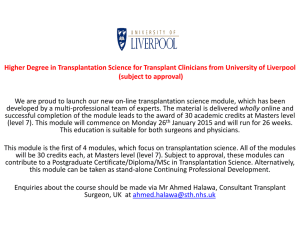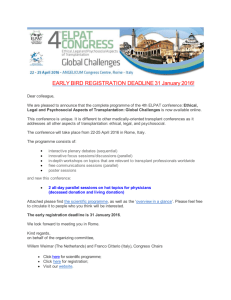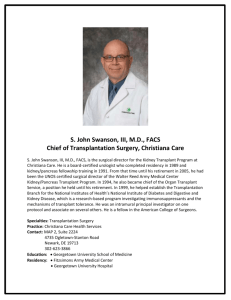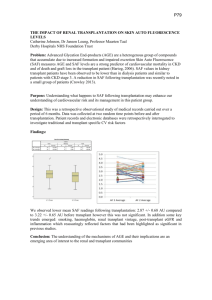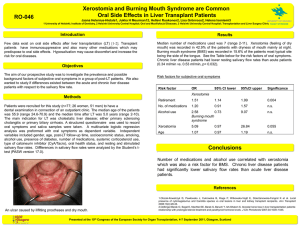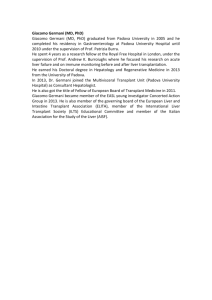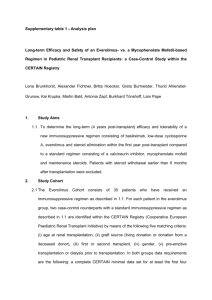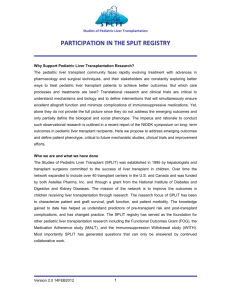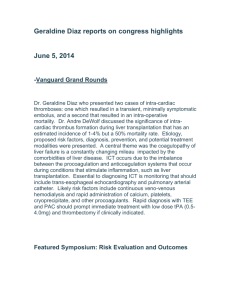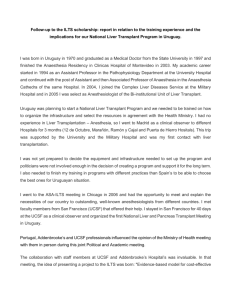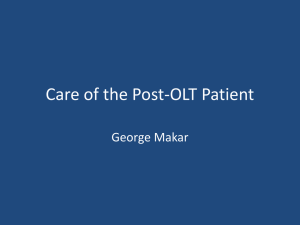Inpt Immunosuppression
advertisement
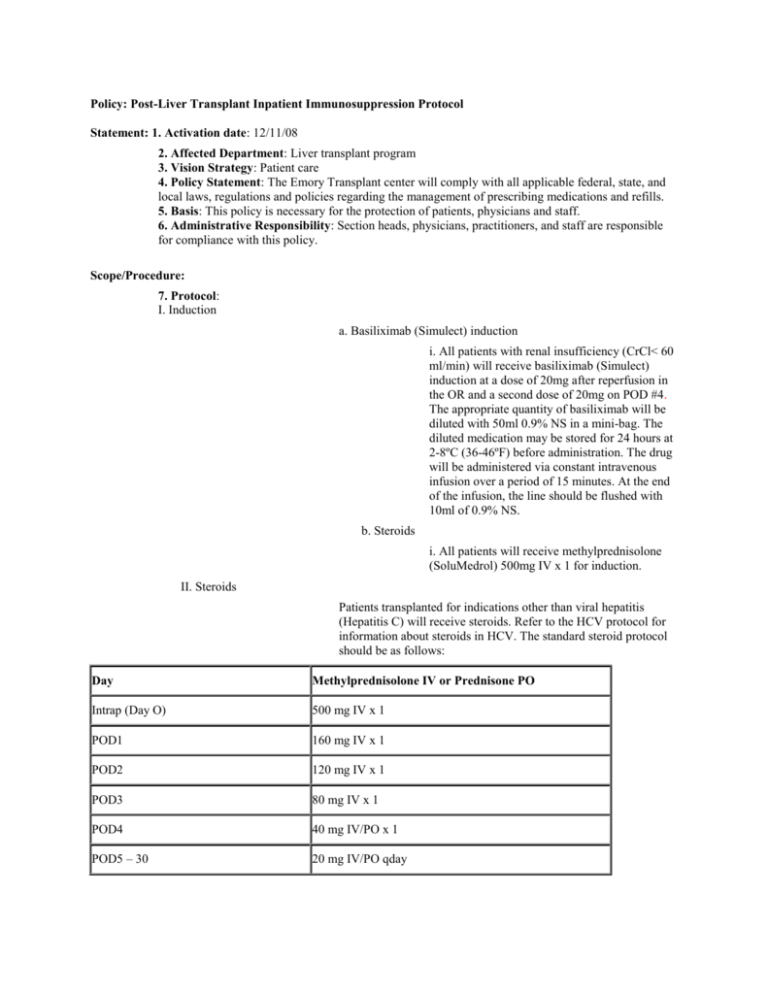
Policy: Post-Liver Transplant Inpatient Immunosuppression Protocol Statement: 1. Activation date: 12/11/08 2. Affected Department: Liver transplant program 3. Vision Strategy: Patient care 4. Policy Statement: The Emory Transplant center will comply with all applicable federal, state, and local laws, regulations and policies regarding the management of prescribing medications and refills. 5. Basis: This policy is necessary for the protection of patients, physicians and staff. 6. Administrative Responsibility: Section heads, physicians, practitioners, and staff are responsible for compliance with this policy. Scope/Procedure: 7. Protocol: I. Induction a. Basiliximab (Simulect) induction i. All patients with renal insufficiency (CrCl< 60 ml/min) will receive basiliximab (Simulect) induction at a dose of 20mg after reperfusion in the OR and a second dose of 20mg on POD #4. The appropriate quantity of basiliximab will be diluted with 50ml 0.9% NS in a mini-bag. The diluted medication may be stored for 24 hours at 2-8ºC (36-46ºF) before administration. The drug will be administered via constant intravenous infusion over a period of 15 minutes. At the end of the infusion, the line should be flushed with 10ml of 0.9% NS. b. Steroids i. All patients will receive methylprednisolone (SoluMedrol) 500mg IV x 1 for induction. II. Steroids Patients transplanted for indications other than viral hepatitis (Hepatitis C) will receive steroids. Refer to the HCV protocol for information about steroids in HCV. The standard steroid protocol should be as follows: Day Methylprednisolone IV or Prednisone PO Intrap (Day O) 500 mg IV x 1 POD1 160 mg IV x 1 POD2 120 mg IV x 1 POD3 80 mg IV x 1 POD4 40 mg IV/PO x 1 POD5 – 30 20 mg IV/PO qday POD 31 – 60 10 mg IV/PO qday POD 61 - 90 5 mg IV/PO qday b. Patients are to be weaned off steroids based on their primary disease and freedom from rejection. Weaning of steroids is based entirely on clinical presentation of patients. Patients with autoimmune diseases which include autoimmune hepatitis (AIH), may not benefit from steroid weans and may be maintained on 10mg of prednisone daily. c. All patients on a steroid taper at discharge will receive a copy of their taper regimen, including dose and date of dosage change to help promote adherence to the protocol. III. Tacrolimus (Prograf) a. Oral tacrolimus will be started after transplantation when renal function has stabilized. Usual dose range is 0.025-0.05 mg/kg q12hr for adults to achieve whole blood trough Imx levels of 8-12 ng/ml throughout the first month post-transplant. b. Tacrolimus dosage should be decreased in the presence of adverse events as clinically warranted. Dosage adjustments should be balanced between severity and timing of rejection episodes in relation to date of transplant. Please refer to the “outpatient immunosuppressive protocol in liver transplantation” for recommendations. IV. Cyclosporine (Gengraf) General dosing recommendations for cyclosporine (Gengraf) is to initiate at 7mg/kg/day in two divided doses to target initial trough levels of 150-180 ng/ml utilizing RIA assay within the first 6 weeks post-transplant. Doses should be individualized for the patient. Cyclosporine may be considered for patients unable to tolerate tacrolimus (Prograf) due to neurological or other side effects. V. Sirolimus (Rapamune) a. Sirolimus should be avoided in the first 21 days (until after staple removal and wound is healed) post-transplant due to the potential risk of delayed wound healing and hepatic artery thrombosis. Please refer to the renal sparing protocol for more information regarding sirolimus. VI. Everolimus (Zortress) Everolimus should be avoided in the first 21 days (until after staple removal and wound is healed) post transplant due to the potential risk of delayed would healing. Please refer to the renal sparing protocol for more information regarding everolimus. VI. Mycophenolate mofetil (CellCept) Mycophenolate mofetil (MMF) will be used as part of a dual or triple immunosuppressive regimen. MMF will be dosed at 1000 mg PO q12hr. MMF will be started within 24 hours of liver transplantation. Dose reduction or discontinuation of MMF should occur if intolerance to the medication. Please refer to dosage adjustment guidelines in “outpatient immunosuppressive protocol in liver transplantation” for specific recommendations. c. Dose increases to 1500 mg PO BID may be considered in those patients that may require more immunosuppression or do not tolerate other immunosuppressants. Conversion from IV to PO Mycophenolate mofetil is done on a 1:1 basis (1000mg PO MMF = 1000mg IV MMF). IV should be considered when the patient is unable to tolerate PO medications. References: Mukherjee S and Mukherjee U. A comprehensive review of immunosuppression used for liver transplantation.. Journal of Transplantation 2009; Article ID 701464, 20 pages, 2009. Martin-Mateos RM, Graus J, Albillos A, et al. Initial immunosuppression with or without basilixmab: a comparative study. Transplantation Proceedings 2012;44(9): 2570-2572, Llado L, Xiol X, Figueras J, et al. Immunosuppression without steroids in liver transplantation is safe and reduces infection and metabolic complications: results from a prospective multicenter randomized study. Journal of Hepatology. 2006; 44(4): 710-716. Marino IR, Doria C, Scott VL, et al. Efficacy and safety of basiliximab with a tacrolimus-based regimen in liver transplant recipients. Transplantation. 2004 Sep 27;78(6):886-91 Approved by: Liver Transplant Leadership Group Approval dates: 6/9/09, 1/24/2011, 10/30/12 Revision: 6/10/11 (based on other protocol changes) __________________________________ Stuart J. Knechtle, M.D. Chair, Liver Transplant Leadership Group Director, Liver Transplant Program ____________________________________ James Spivey, MD Medical Director, Liver Transplant Program Regulatory References: Related Policies/Procedures: renal sparing protocol, pathway Approved By Transplant Leadership Group Key Words For Search: immunosuppression, basiliximab Approval dates: 12/7/2012, 6/23/2014
